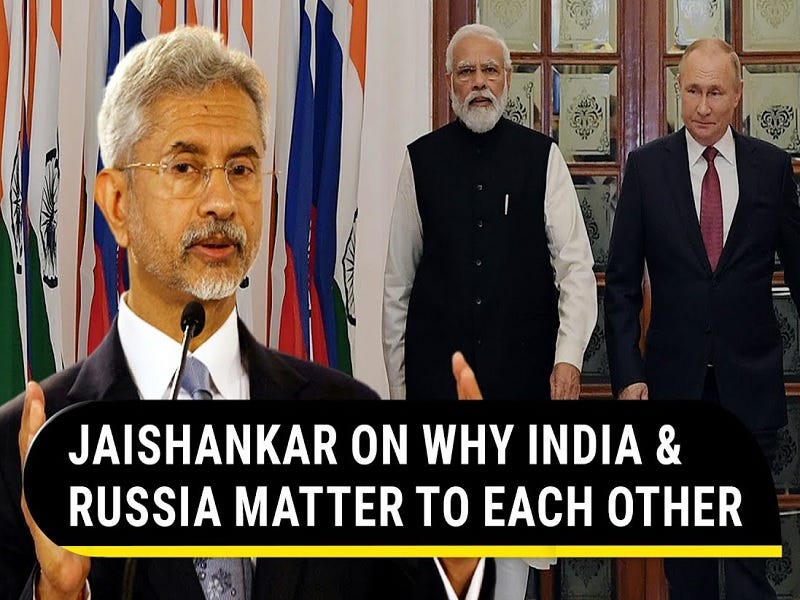Jaishankar Reaffirmed India’s Trust In Russia Amidst Claims Of The Latter Drifting Towards China
Although there are some in Russia who doubt that a return to Sino-US bi-multipolarity can be prevented and therefore favor policies that de facto constitute becoming China’s “junior partner” in order to help it beat America as soon as possible, this policymaking faction is in the minority and not influential.
Indian External Affairs Minister (EAM) Dr. Subrahmanyam Jaishankar was asked during an interaction with his country’s diaspora in Singapore about the future of Russian-Indian relations amidst claims of Russia drifting towards China over the past two years. His response deserves to be shared in full due to how insightful it is, after which his wise words will then be analyzed in the larger context. Here’s how EAM Jaishankar responded:
“India should look at a country, not just Russia, from the perspective of that nation. So, tell me has Russia helped us or harmed us? Has Russia at crucial moments contributed or obstructed? Going ahead, are there gains to be made from Russia or is it only damage which will come out?
So, if I do my calculations from my perspective and my experiences, I will get the answer.
And the answer in this case is that Russia is a country with which we have always had a positive relationship. Both India and Russia have taken that extra care to look after each other's interests. So, I think we should have that confidence as we go forward.”
Here are three background briefings that the reader is requested to review before proceeding further:
* 1 February: “India Has The Right Attitude Towards Competition With China”
* 25 February: “India’s Top Diplomat Explained Why His Country Is Doubling Down On Ties With Russia”
* 18 March: “Tri-Multipolarity Should Become The Next ‘Big Idea’ In Russian-Indian Relations”
They’ll now be summarized so that the reader can understand how they relate to this analysis.
Regarding the first, EAM Jaishankar said that competition shouldn’t be shied away from, but embraced. This segues into the second whereby he strongly hinted that India doubled down on ties with Russia in order to prevent its strategic partner’s potentially disproportionate dependence on China. And as for the last of these three, the tri-multipolarity model recognizes the US-led West’s Golden Billion, the Sino-Russo Entente, and the informally Indian-led Global South as the world’s top three centers of influence.
The interplay between and within these poles shapes the ongoing global systemic transition, which is trending towards complex multipolarity (“multiplexity”) but is presently at a tri-multipolar crossroad whereby it’ll either continue moving in that direction or revert back to a form of Sino-US bi-multipolarity. Readers can learn more about this paradigm from the relevant analysis, but it’s referenced in this piece since Russian-Indian relations keep multipolar trends on track, which advances their shared interests.
When viewed through this prism, it makes sense why India doubled down on its ties with Russia for the previously mentioned purpose of preventing its strategic partner’s potentially disproportionate dependence on China, which remains India’s rival despite those two’s membership in BRICS and the SCO. To be clear, Russian-Chinese relations are better than at any time before in history, but the first is still sensitive about perceptions of dependence on the second, let alone tangible movement that direction.
This explains why Russia enthusiastically reciprocates all of India’s outreaches since it’s the only country capable of preemptively averting this scenario. Their mutually appreciated “affectionate diplomacy” over the decades, India’s massive market potential (especially for energy and military exports), and its deep suspicions of China stemming from their long-running unresolved border disputes account for its irreplaceable role in Russian geostrategy.
Their respective balancing acts correspondingly complement each other and thus accelerate complex multipolar processes that push back against latent bi-multipolar trends in the global systemic transition. Although there are some in Russia who doubt that a return to Sino-US bi-multipolarity can be prevented and therefore favor policies that de facto constitute becoming China’s “junior partner” in order to help it beat America as soon as possible, this policymaking faction is in the minority and not influential.
Their media surrogates have become louder than ever in the run-up to this October’s BRICS Summit in Kazan, but they’re unable to convince those who matter to abandon Russia’s Sino-Indo balancing act on the false pretext that India is a “Trojan Horse” of the West. What they can do is manipulate perceptions of Russian policy through provocative claims on its platforms, however, and their closeness to certain institutions can mislead observers into conflating their provocative social media posts with their policies.
Nevertheless, for as active as they are, India knows that this policymaking faction remains in the minority and doesn’t influence the course of events as proven by EAM Jaishankar’s latest statement. Their efforts to get Russia to invite Pakistan to this year’s “Outreach”/“BRICS-Plus”, despite how offensive this would be to India for the reasons explained here earlier in this month, will likely fail. On the off chance that they succeed, India’s trust in Russia would be harmed, which goes against both of their interests.



I agree with you Andrew, this is a great move forward for the longevity of the BRICS as a system. And in the future, other countries with critical contributions, should know they could become equal nodes in the matrix.
Applying Jaishankar’s analysis to the history of U.S.- Russia relations is instructive. Russia blocked the English at sea contributing to the success of the American Revolution, Russia supported the North in the American Civil War and need I note they performed admirably as allies in WW
2.